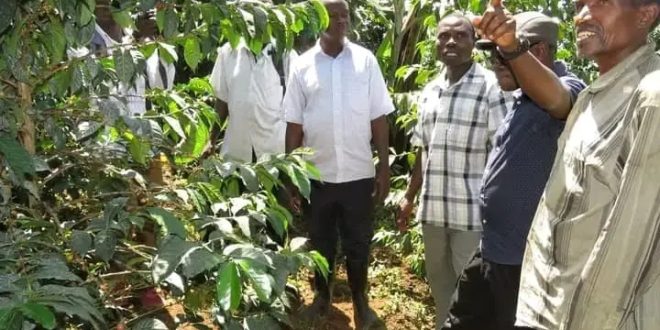By Weswa Ronnie
MBALE CITY
Feed the Future Uganda has urged farmers in the Bugisu subregion to adopt organic fertilizers to boost crop production and soil fertility.
The call was made today Tuesday, 12th November, 2024 by Dr. Ambrose Wabyoona, Senior Crop Husbandry Officer with Feed the Future Uganda, at Mount Elgon hotel during a three-day workshop on improved agronomic practices at the Buginyanya Zonal Agricultural Research Institute (BUZARD) in Bulambuli District.
Dr. Wabyoona emphasized that soils in the Mount Elgon slopes lose fertility rapidly due to increased use of inorganic fertilizers, which can negatively affect crop quality.
Farmers attending the training acknowledged that continued use of inorganic fertilizers diminishes soil fertility, making it difficult to grow crops without their application.
Oliver Kishelo, a coffee and matooke farmer from Bulambuli, criticized government policies allowing counterfeit agricultural inputs on the market.
She noted that many food crops produced with inorganic substances lack the natural taste and aroma consumers expect.
Namono Beatrice, a farmer from Sironko, shared that her land has become so dependent on fertilizers that she cannot grow onions and tomatoes without them, which drives up her production costs.
Bududa District Agriculture Officer, Stephen Wachawa expressed disappointment with agricultural extension staff for not educating farmers on modern organic farming practices.
He explained that natural manures, such as cow dung and mulch, help retain soil moisture and support beneficial organisms that enhance crop quality.
Alfred Sekele, the District Agriculture Officer in Bulambuli, called on stakeholders in the Bugisu subregion to promote organic farming over conventional inorganic methods.
Last month, Feed the Future Uganda, in partnership with the Ministry of Agriculture, Animal Industry, and Fisheries, and supported by the World Food Program, conducted a study on the impact of inorganic versus organic agriculture in the Bugisu subregion.
The study found that 70% of farmers primarily rely on industrial inorganic fertilizers, which deplete soil moisture and expose the land to erosion and mudslides.
Source link
 The Impalaa Reports Impalaa is your biggest news source in Uganda and the East African region, bringing breaking news, daily updates, and the latest stories from Uganda.
The Impalaa Reports Impalaa is your biggest news source in Uganda and the East African region, bringing breaking news, daily updates, and the latest stories from Uganda.


